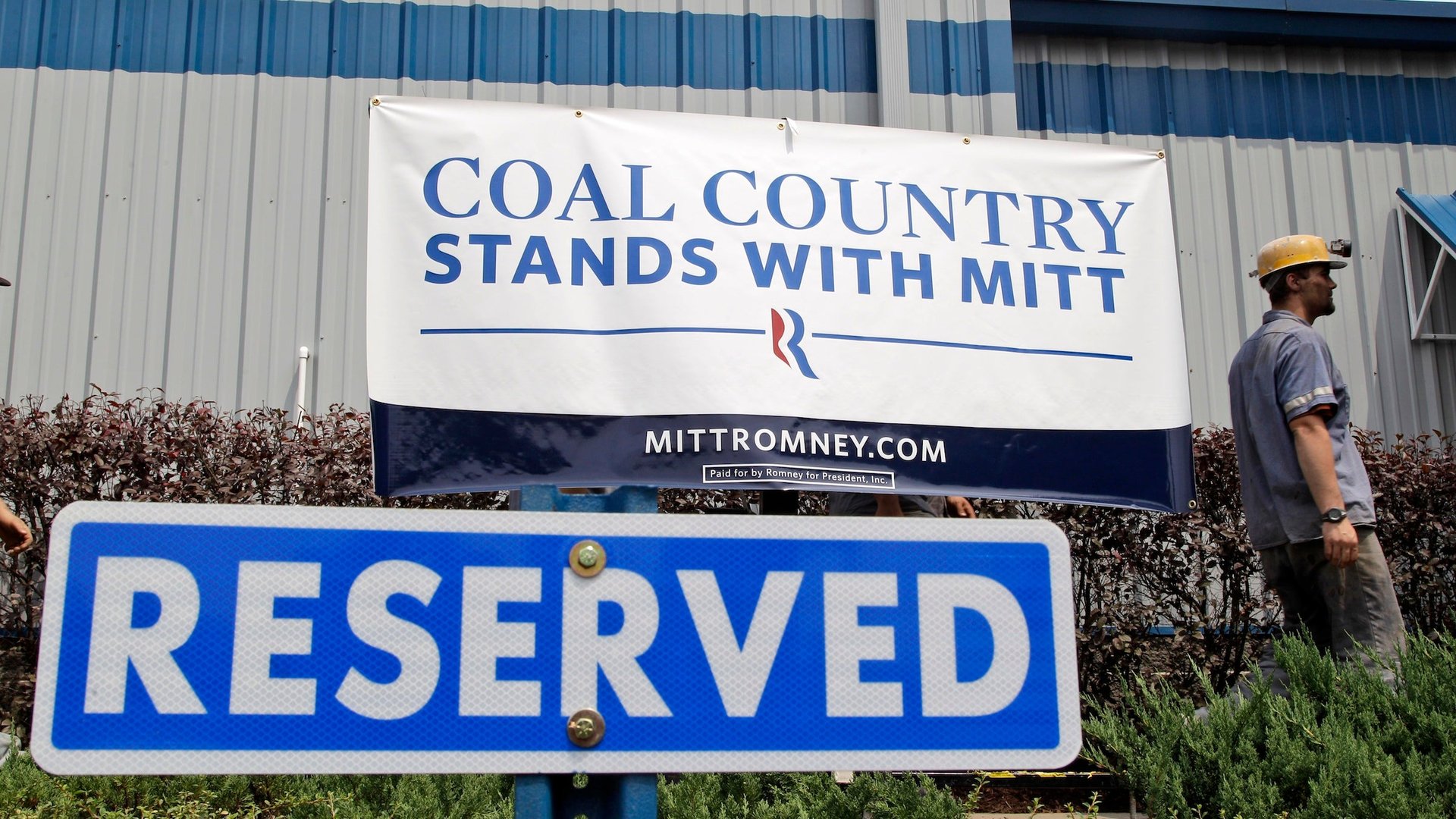Is the energy industry being punished for its bad election bet?
The evening of Nov. 6 was horrendous for the US fossil fuel industry, which spent more than $160 million in a largely one-sided bet against President Barack Obama and other Democrats. That was a combination of campaign ads ($158 million just as of September) and direct contributions to losing Republican candidate Mitt Romney (at least $5.7 million).


The evening of Nov. 6 was horrendous for the US fossil fuel industry, which spent more than $160 million in a largely one-sided bet against President Barack Obama and other Democrats. That was a combination of campaign ads ($158 million just as of September) and direct contributions to losing Republican candidate Mitt Romney (at least $5.7 million).
So it went for big swaths of US business. As my colleague Matt Phillips writes, Wall Street threw its considerable financial weight behind Romney as well. So did Restore Our Future, the main so-called “super PAC” that financed Romney with largely business donations, spending $88.5 million to defeat Obama, and another $14 million to elect his Republican opponent.
The day after did not go much better. The Dow plunged 2.3% on Nov. 7, but the hit seemed to strike particularly hard at the sectors that, by their campaign contributions, suggested they had the most to lose with Obama’s election. Coal companies sank—Peabody Coal went down by 9.2%, and Alpha Natural Resources by 12.6%. James River Coal plummeted a whopping 22%. A couple of shale gas specialists were hammered—Chesapeake Energy fell by 5.2% and Devon by 7.6%. Wall Street suffered too—the S&P finance sector index plunged by 3.52%.
Were investors punishing the bad campaign bets? Or signaling bad feelings about Obama? Perhaps—but the most sober thinking was that Wall Street simply woke up and saw the fiscal and macroeconomic trouble ahead in the US and Europe. As we’ve previously discussed, at least the fossil-fuel industry’s fixation with defeating Obama seemed far more emotional than anchored in cool, bottom-line calculation.
Now that the war has been decided, what is next? Based on a half-sentence on global warming in Obama’s victory speech, some say climate change is back on the White House agenda. I asked a couple of people if that can be the case, given how the fossil fuel industry crushed what seemed certain triumph of climate legislation two years ago.
It is on the agenda, said Charles Ebinger, who runs the energy program at the Brookings Institution: “I believe the President sees climate change as a central problem of our time and wants his legacy to be that he fought to address it on a global basis.” Specifically, Ebinger says, Obama will seek to enact a tax on carbon, a solution to greenhouse gas reduction advanced three years ago by ExxonMobil CEO Rex Tillerson. Ever since climate change slipped off of the US political agenda, Tillerson has stopped talking about carbon taxes. So, given politics, how would Obama get such a tax through Congress? “As part of a grand bargain on the deficit with a cut in income taxes,” Ebinger said.
Not so, replied Neil Brown, an energy-policy adviser to the Senate Foreign Relations Committee. “In terms of policy, there is no reason to think that the president will put more emphasis on climate than he did previously,” Brown said. “Even if so, he’d have to revise his strategy for working with Congress. … Many Republicans are extremely dug in on climate.”
The other question is the presidential candidates’ competing views on American shale oil and gas, the reserves now being exploited by the controversial method of hydraulic fracturing, or “fracking”. Romney advocated unfettered drilling, while Obama said production is already surging. These volumes are part of the talk of North America becoming independent of foreign sources of oil. So will production proceed apace?
No it won’t, says John Hofmeister, former president of Shell USA. He says that the industry is expecting “an onslaught of new regulation” in the second Obama administration. And don’t be surprised if it reacts with the equivalent of a sitdown strike. “Watch the hydrocarbon industry go into a form of hibernation due to regulation and simply wait out the next term,” he predicts. Meanwhile, the nation will confront “gasoline shortages and ever-higher prices over the later years of the Obama period,” he said.
But Frank Maisano, a policy analyst at Bracewell & Giuliani, suggests the industry will adjust. Regulations may become tighter, he said, but companies are accustomed to handling such matters. “The industry will continue to develop our resources and meet the demands of consumers in the most affordable and reliable way,” Maisano said.
Until the next congressional elections in 2014, right?